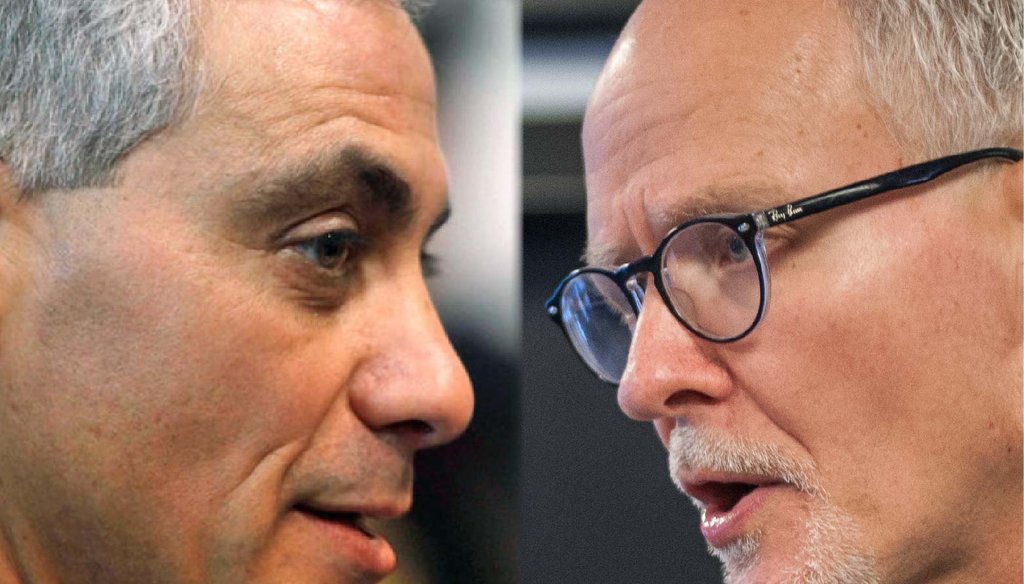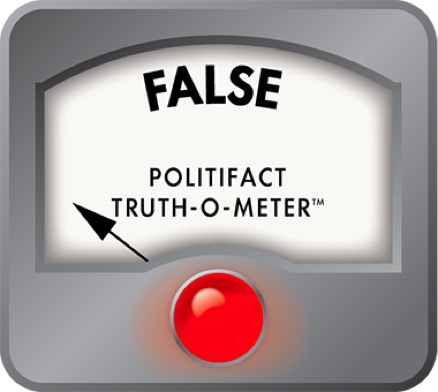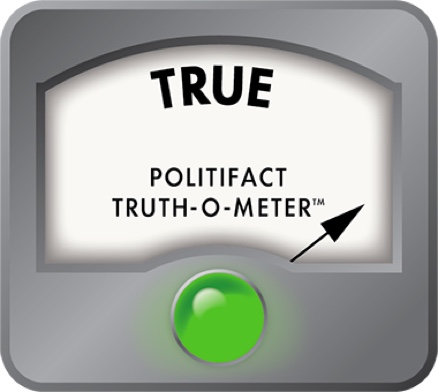Stand up for the facts!
Our only agenda is to publish the truth so you can be an informed participant in democracy.
We need your help.
I would like to contribute

Votes in the next Chicago mayor’s race won’t be counted until February, but Rahm Emanuel and Paul Vallas, the city’s onetime schools CEO, are already trading shots over which of them bears blame for the chronic financial ills of the district.
The two are accusing each other of essentially the same thing: failing to take steps necessary to ensure the health of the state’s oldest public pension system — and putting teachers, students and taxpayers on the line in the process.
That finger-pointing is only likely to intensify in coming months, and the arguments being tossed around by both camps are complicated, nuanced and laden with speculation. So we thought it would be an illuminating exercise early in the contest to sort out facts from conjecture.
Vallas, one of many prospective candidates announcing an intention to challenge Emanuel’s re-election bid, is casting himself as an issues-focused problem-solver whose leadership dug the Chicago Public Schools out of a financial pit when he took control of the system in 1995 at the behest of then-Mayor Richard M. Daley.
But the gist of Emanuel’s critique centers on how key changes to the way CPS managed pension money took root under Vallas and led to serious financial problems that are still fueling controversy and pain. In a recent Chicago Tribune article, a spokesman for Emanuel’s campaign claimed Vallas "planted the seeds of the pension crisis" for CPS.
Vallas shot back in a WGN radio interview that Emanuel, elected mayor in 2011, punted on seeking a pension fix during his first term and thereby was complicit in allowing problems to worsen and taxpayer costs to grow.
So who is right? History suggests both have a point.
The teacher pension plight at CPS has played out against the backdrop of an even more troublesome crisis at state-managed retirement funds for suburban and Downstate teachers as well as state workers and public university employees.
A common thread in all those problems is a failure by public officials to keep promises to regularly invest in the pension funds, instead diverting resources to more voter-pleasing purposes or to avoiding hiking taxes.
One difference, however, is that problems at the state funds grew over nearly a century of mismanagement by Republican and Democratic officials alike. The downward spiral of the Chicago teachers’ fund took place much more recently.
Records show the fund was in fairly healthy financial shape in 1995 when Vallas assumed control of the schools. Until then, city property taxpayers paid into a special levy dedicated solely to funding teacher pensions. CPS couldn’t touch the money for other purposes.
But state law governing the Chicago teacher pension fund was changed as Vallas, who served as Daley’s budget director, shifted over to run the schools.
Democrats have controlled state government for so long that it’s become almost a reflex for Republicans to blame them for financial missteps. But the pension law change that precipitated the downward slide at the Chicago teachers fund was approved during a two-year interlude in the mid-1990s when the GOP held complete power in Springfield.
Daley and Vallas quickly took advantage of the financial flexibility and embarked on what became a decade in which money once earmarked for pensions was used instead to help cover operating costs—one reason why Vallas can boast that as schools CEO he balanced budgets and even built up surpluses.
The economy was booming in the early years of the diversions, so the teacher pension fund balance was still sound when Vallas departed CPS in 2001 to run the school system in Philadelphia. The reckoning for the fund began a few years later as the investment market weakened and unfunded liabilities began to rise.
Charles Burbridge, the current executive director of the teachers’ fund, said that, in hindsight, the decision not to fund the pensions for years was risky even though the deferrals made under Vallas took place as the economy soared.
"When the rate of returns dropped, they had to scramble to find a source of funding again," said Burbridge, who served as the deputy chief financial officer at CPS under Vallas.
By 2006, Daley’s administration did resume making payments into the pension fund. But a few years later, as another school financial crisis loomed, Daley went back to Springfield to secure permission to reduce payments for another three years.
That partial pension holiday was in effect when Emanuel succeeded Daley, and the new mayor did not move to rescind it. Indeed, Emanuel asked lawmakers to grant CPS pension relief for an extra two years, but that effort failed.
We asked the mayor’s office to reconcile how it could accuse Vallas of unsound policy in deferring pension payments when Emanuel sought to do the same thing years later. A spokeswoman sent us a statement that ignored the question entirely.
In 2017, Emanuel did gain concessions, getting the Legislature to commit new state money to help support Chicago teacher pensions. But, Vallas asks, why didn’t Emanuel act sooner to stem the bleeding?
"That deferment of responsibilities alone — it will probably deprive the pension system of about a billion and a half dollars," Vallas said on WGN.
His calculation is based on taking the value of pension relief that Emanuel obtained from the state last year and extrapolating it backwards to cover years the mayor didn’t secure similar help.
Emanuel’s administration told the Chicago Tribune in 2015 that the mayor had delayed making full pension payments and put off seeking new sources of revenue because he first wished to pursue budget cuts and pension reform on behalf of city taxpayers.
Whether or not earlier efforts would have proved successful, however, remains purely speculative.
The speed with which CPS’ pension fund slipped from good health makes the issue a prime target for the political blame-game. But that same relatively recent history also demonstrated that no single action was wholly to blame for damaging the financial vitality of the fund.
However short-sighted the first round of deferrals may have been, Burbridge said the second round that commenced in the aftermath of the Great Recession was even riskier.
When market returns began to sag in late 2001, Burbridge explained, "we said maybe the canary’s singing in the coal mine. In 2009, the buzzards are circling already and yet you still pull funding."
Emanuel and Vallas each blame the other for failing to heed the long-term needs of the district and its retirees: Vallas for opting not to pay into the pension fund when the economy was strong and Emanuel for waiting into his second term before working to secure new sources of revenue.
But both played a role in the trajectory of the fund’s freefall — as did the Daley administration, and the lawmakers who gave the city what one Democratic state senator in 1995 called "the rope that the Mayor of the City of Chicago needs to hang himself with."
Of course, Emanuel not only failed to plan for the future but continued to delay payment even as the system continued to slip further into decline.
Vallas and Daley edged the teachers’ pension fund toward a fiscal cliff ahead of two recessions. Emanuel helped push it over.
"There’s an old saying that success has many parents and failure is an orphan," Burbridge said. "But the reality is, there's just as many parents around when things are bad as when things are good."
Our Sources
Vallas: Chicago ‘in big trouble’ under Emanuel’s ‘politically expedient’ City Hall approach, Chicago Tribune, May 1, 2018
Paul Vallas: "The budget is designed to be an investment vehicle," WGN Radio, May 4, 2018
Politicians helped bring Chicago's public pension funds to the brink of insolvency, Chicago Tribune, Nov. 16, 2010
Illinois lawmakers gave Chicago's mayor the freedom to ruin school finances, Chicago Tribune, Aug. 22, 2015
Here's why Chicago Teachers' Pension Fund is in meltdown, Crain’s Chicago Business, Nov. 29, 2012
CPS pension holiday bill fails, Chicago Tribune, May 31, 2013
Phone interview, Pete Giangreco, Emanuel campaign spokesman, May 2 and 3, 2018
Phone interview, Paul Vallas, May 7 and 8, 2018
Phone interview, Charles Burbridge, Chicago Teachers’ Pension Fund Executive Director, May 8, 2018
Email interview, Tracey Schroeder, Chicago Teachers’ Pension Fund spokeswoman, May 8-10, 2018
Chicago Teachers’ Pension Fund Timeline
Email interview, Molly Poppe, City of Chicago Office of Management and Budget spokeswoman, May 8, 2018






































